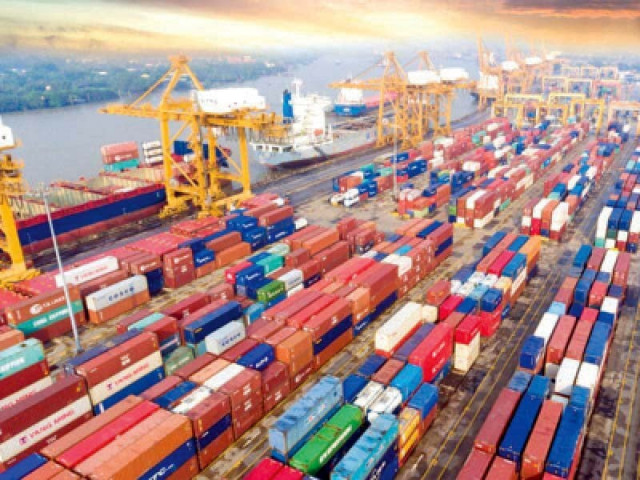Traders demand raw material delivery points
Call for issuing more licences for quick delivery of imported goods

Businessmen have urged the government to set up delivery points for imported raw material in the industrial areas and issue more licences to facilitate and expedite the delivery of imported goods.
“Issues related to smooth delivery of goods at the port should be resolved immediately,” said Korangi Association of Trade and Industry (KATI) President Salman Aslam while talking to a Customs delegation that visited the KATI office.
“Importers, specifically the small-scale importers, who import less than one container, face the issue of delayed delivery,” Standing Committee Chairman Farazur Rehman said while talking to The Express Tribune.
Consignments get stuck at points near Karachi Port and importers suffer prolonged delay, high cost of delivery and consequent traffic jams, he said.
“It is necessary to facilitate the importers by allowing fast movement of Less Container Load (LCL) cargo,” remarked Union of Small and Medium Enterprises (Unisame) President
Zulfikar Thaver.
Imports have become costly and many SMEs are not in a position to import Full Container Load (FCL) containers and opt for LCL, he pointed out.
In many developing countries, points are set up in the industrial areas for expeditious delivery of LCL cargo for fast-track logistics, he said. Similarly, “SME exporters must be facilitated for
LCL shipments”.
“We need to develop proper infrastructure to set up such delivery points,” said Taurus Securities Head of Research Mustafa Mustansir. “Industries import raw material in bulk quantities, depending on the nature of the industry.”
Imported goods should reach factories at low cost and within time to save exporters from losses as they need such goods for value-added exports and to minimise the production cost, said Arif Habib Commodities CEO Ahsan Mehanti.
Pakistan is facing tough business conditions owing to the surge in energy prices and the withdrawal of subsidies by the government, he pointed out.
During his visit to the KATI office, Chief Collector Customs South Wajid Ali said that the Customs is making innovation and has collected historic high taxes.
Steps are being taken to facilitate the business community in exports and imports. Help desks will be set up in key industrial areas like KATI to facilitate the business community, he emphasised.
KATI president underlined the need for taking steps to designate the National Bank branches in industrial areas for the collection of duties while the bank branches should be opened in trading centres and other
industrial areas.
Aslam further said that exporters and industrialists should be offered maximum facilities for the submission of duties as it will increase the revenue collection and promote economic activities.
Standing Committee Chairman Rehman suggested that an online complaint mechanism should be established to address all issues, concerns and grievances of the business community related to customs.
Major obstacles to smooth customs operations are absence of container terminal regulation body, misuse of tax and duty exemptions given to former Fata and Pata areas, delay in tax refunds, unfair demurrage charges, lack of digitisation and inadequate investment in container scanners, inadequate diversification of HS and PCT codes and neglect of the principle of cascading for the industrial raw material, he said.
“There should be adequate consultation process with the stakeholders of the business community.”
He pointed out that Karachi gives 70% of the country’s revenue while the city’s 70% revenue is generated from the Korangi Industrial Area, therefore problems of the industrial region should be solved on a priority basis.
He called for setting up a regulatory authority for container terminals to improve working procedures between the traders and container terminals.
Published in The Express Tribune, July 17th, 2022.
Like Business on Facebook, follow @TribuneBiz on Twitter to stay informed and join in the conversation.


















COMMENTS
Comments are moderated and generally will be posted if they are on-topic and not abusive.
For more information, please see our Comments FAQ